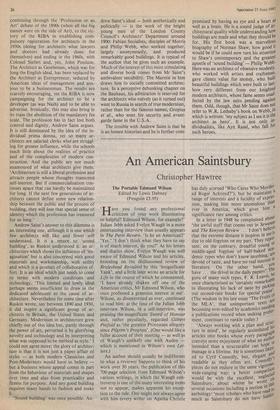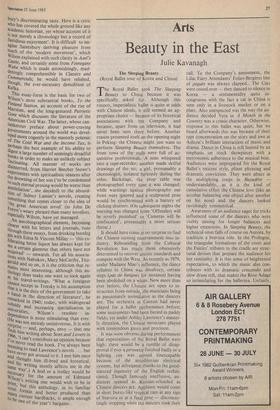An American Saintsbury
Christopher Hawtree
The Portable Edmund Wilson Edited by Lewis Dabney (Penguin £3.95)
`Have you found any professional criticism of your work illuminating or helpful? Edmund Wilson, for example?' Julian Jebb asked Evelyn Waugh in a more entertaining interview than usually appears in The Paris Review. 'Is he an American?' 'Yes.' I don't think what they have to say is of much interest, do you?' As his letters and diaries show, Evelyn Waugh was well aware of Edmund Wilson and his articles, brooding on the disillusioned review of Brideshead Revisited by this 'insignificant Yank', and a little later wrote an article for Life in the course of which he commented, 'I have already shaken off one of the American critics, Mr Edmund Wilson, who once professed a generous interest in me'. Wilson, as disinterested as ever, continued to read him: at the time of the Julian Jebb interview Wilson, in a self-interview, was praising the magnificent Sword of Honour and, rather peculiarly, regarded Gilbert Pinfold as 'the greatest Protestant allegory since Pilgrim's Progress'. (One would like a fuller account of their meeting — as well as of Waugh's unlikely one with Auden which is mentioned in Wilson's own Let- ters.)
An author should usually be indifferent to what a reviewer happens to think of his work over 30 years; the publication of this 700-page selection from Edmund Wilson's various writings, in which the Waugh con- troversy is one of the many interesting items not to appear, makes apparent his excep- tion to the rule. One might not always agree with him (every writer on Agatha Christie has duly scorned 'Who Cares Who Murder' ed Roger Ackroyd?'), but he maintains a
range of interests and a lucidity of exPres" sion, making him more anomalous than ever in America, which gives him a significance rare among critics. In a letter in 1948 he complained about 'the awful stuff that comes out in Sewanee and The Kenyon Review ... I don't believe that the extreme distaste it inspires in me 15 due to old-fogyism on my part. They rePre- sent, on the contrary, dreadful young or middle-aged fogyism of half-baked aca- demic types who don't know anything, are
devoid of taste, and have no real interest in
literature. On the other hand, you have ... the drivel in the daily papers'. The guru of many such types, F. R. Leavis, The once characterised as 'certainly remarkable in illustrating his lack of taste by Pielctng out second-rate books for special praiseef (The wisdom in his late essay 'The Fruits the MLA', that unimportant texts are becoming over-edited by academics needing a publications record when seeking Prefer ment, continues to rankle today.) 'Always working with a plan and strue; ture in mind', he regularly assimilated la, articles into books whose every paragraP; conveys more enjoyment of what an alltil(t) intended than a structuralist can hope to manage in a lifetime. He is sometimes liked ed to Cyril Connolly, but, elegant arts readable as they often are, Connolly pieces do not endure in the same vign1.9% wide-ranging way; a better comParlsrjed would be with the excellent, neglected Saintsbury, about whom he wrote on several occasions including a section in tll;, anthology: 'most scholars who have react: much as Saintsbury do not have Salta' bury's discriminating taste. Here is a critic who has covered the whole ground like any academic historian, yet whose account of it is not merely a chronology but a record of fastidious enjoyment'. It is difficult to im- agine Saintsbury deriving pleasure from much of the 'modern movement', which Wilson explained with such clarity in Axel's Castle, and certainly none from Finnegans Wake which is made astonishingly, mad- deningly comprehensible in Classics and Commercials; he would have relished, though, the ever-necessary demolition of
Kafka.
This essay-form is the basis for two of Wilson's most substantial books, To the Finland Station, an account of the rise of Marxism, and the long-gestated Patriotic Gore which discusses the literature of the American Civil War. The latter, whose can- tankerous preface about power-craving governments around the world was devel- °Ped more cogently in the masterly polemic of The Cold War and the Income Tax, is Perhaps the best example of his ability to digest a large number of seemingly dreadful books in order to make an unlikely subject fascinating. All manner of works are disinterred, from Harriet Beecher Stowe's experiments with spiritualistic seances after the drowning of her son (`to be condemned to such eternal prosing would be worse than annihilation' she decided) to the absurd- ities of Sidney Lamier's novels, creating something that comes closer to the idea of theore great American novel' (in John De Fst's weary phrase) than many novelists, especially Wilson, have yet managed. An autobiographical element, becoming clearer with his letters and journals, runs tinough these essays, from drinking bootleg gin with Edna St Vincent Millay — 'this ex- hilarating bitter liquor has always kept for ale a certain glamour that others have not acquired' — onwards. For all his associa- tions with Nabokov, Mary McCarthy, Fitz- gerald and so on, it is the criticism that re- mains most interesting, although this an- thology does make one want to look again at his travel-writings. 'What a foreigner cannot accept in Trotsky is his assumption that it is the duty of the government to take a hand in the direction of literature', he remarked in 1940; today, with widespread subsidy and increasing specialisation in Universities, Wilson's resolute in- ,a,.ePendence is more stimulating than ever. (He was not entirely ominivorous. It is with surprise — and, perhaps, envy — that one finds him writing about Sons and Lovers in !?66, can't contribute an opinion because I've never read the book. I've always been eaning t red Lawrenc's noves ... but have nevero gota around to i et. I metl him once and thought him ill-bred and hysterical, sand his writing mostly affects me in the it,„Ine Way%) A hod or a trolley would be arY for the amount of Edmund _r! son's writing one would wish to be in Print, but this anthology, in its familiar stout format and better produced than to current hardbacks, is ample enough to be one of the year's bargains.



















































 Previous page
Previous page